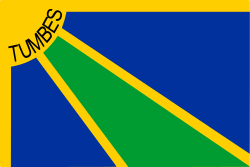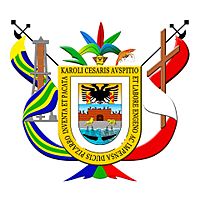Tumbes facts for kids
Tumbes is a city located in the northern part of Peru. It is the capital city of the Tumbes Region. Tumbes is known for its warm climate, beautiful beaches, and important natural areas. The city is close to the border with Ecuador, making it a key place for trade and travel between the two countries.
Contents
Where is Tumbes Located?
Tumbes is situated on the Pacific coast of Peru. It is very close to the equator, which means it has a tropical climate. The city is built along the Tumbes River, which flows into the Pacific Ocean. This location gives Tumbes access to both river and ocean resources.
Climate and Weather in Tumbes
The weather in Tumbes is usually warm and sunny all year round. Temperatures often stay between 25°C and 30°C (77°F and 86°F). There can be some rain, especially during the wet season from December to April. This warm weather makes Tumbes a popular place for tourists who enjoy beaches and outdoor activities.
A Look at Tumbes' History
Tumbes has a long and interesting history. Before the Spanish arrived, the area was home to several important ancient cultures. These groups lived by the rivers and the sea, using the rich natural resources.
Early Civilizations of Tumbes
One of the earliest groups to live here was the Tumpis people. They were skilled fishermen and farmers. Later, the Inca Empire expanded its control to include Tumbes. The Incas built roads and organized the region. Tumbes was an important coastal outpost for the Inca Empire.
The Arrival of the Spanish
In 1532, the Spanish explorer Francisco Pizarro landed in Tumbes. This was one of the first major encounters between the Spanish and the Inca Empire. The Spanish were impressed by the city and its people. Tumbes played a role in the Spanish conquest of Peru.
What Tumbes is Like Today
Today, Tumbes is a busy city with a growing economy. It is a center for fishing, farming, and tourism. Many people visit Tumbes to enjoy its natural beauty and learn about its history.
Economy and Jobs in Tumbes
- Fishing: The ocean provides many types of fish and seafood. Fishing is a major industry here.
- Agriculture: Farmers in Tumbes grow crops like rice, bananas, and cotton. The warm climate helps these plants grow well.
- Tourism: Visitors come to Tumbes for its beaches, national parks, and wildlife. This creates many jobs in hotels, restaurants, and tour companies.
Getting Around Tumbes
Tumbes has a small airport that connects it to other cities in Peru. There are also bus services that travel to different parts of the country and to Ecuador. Within the city, people use taxis and local buses to get around.
Nature and Wildlife in Tumbes
Tumbes is famous for its unique natural environments. It has beautiful beaches, dry forests, and important mangrove swamps. These areas are home to many different kinds of plants and animals.
The Mangroves of Tumbes
The Manglares de Tumbes National Sanctuary is a special protected area. Mangroves are trees that grow in salty water along coastlines. They create a unique ecosystem.
- Home for Animals: Mangroves are nurseries for many fish, crabs, and shellfish. They also provide a home for many bird species.
- Protecting the Coast: These trees help protect the coastline from erosion and storms. They are very important for the environment.
Beaches and Coastal Life
Tumbes has some lovely beaches, such as Punta Sal and Zorritos. These beaches are popular for swimming, sunbathing, and water sports. The warm ocean water is perfect for a relaxing day by the sea.
Culture and Traditions
The people of Tumbes have a rich culture that mixes ancient traditions with modern life. Festivals and local food are important parts of their daily lives.
Local Food in Tumbes
Because Tumbes is on the coast, seafood is a big part of its food.
- Ceviche: A popular dish made with fresh raw fish marinated in lime juice.
- Arroz con Mariscos: Rice mixed with various seafood.
- Chifles: Thinly sliced, fried green plantains, often served as a snack.
Festivals and Celebrations
Tumbes celebrates several traditional festivals throughout the year. These events often include music, dancing, and colorful parades. They are a great way to experience the local culture.
See also
 In Spanish: Tumbes (desambiguación) para niños
In Spanish: Tumbes (desambiguación) para niños
 | William M. Jackson |
 | Juan E. Gilbert |
 | Neil deGrasse Tyson |



